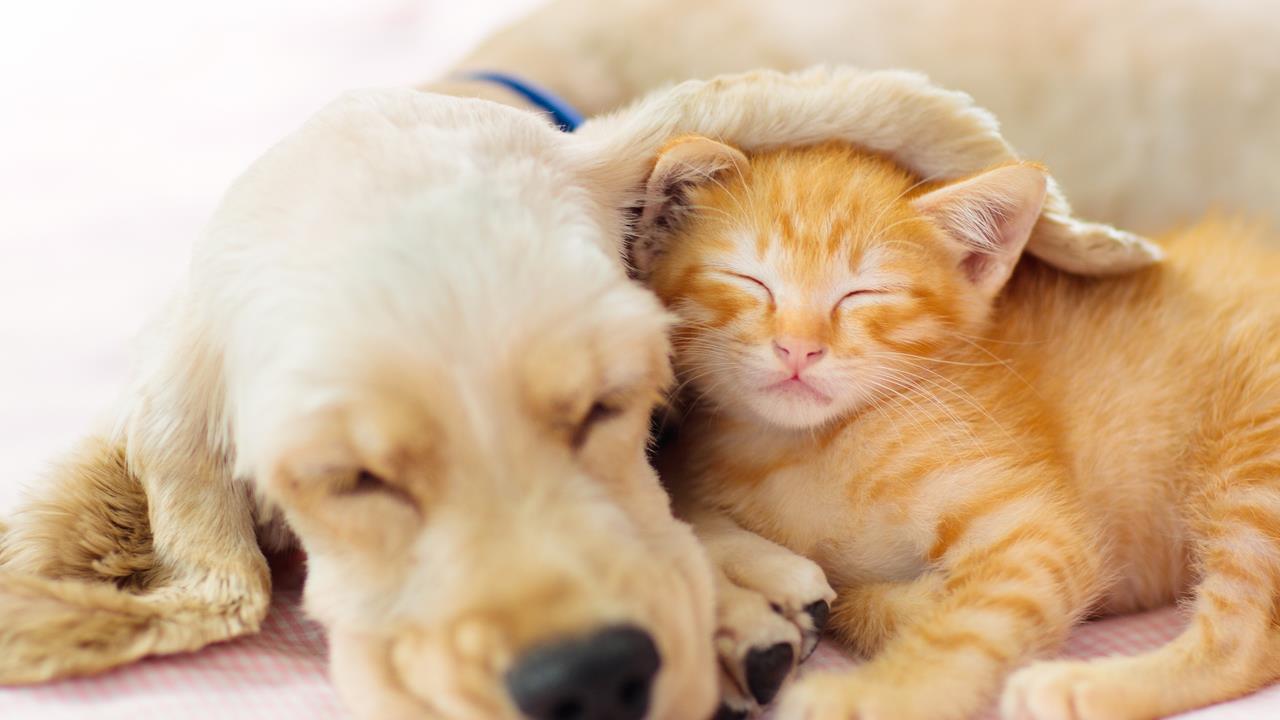Most people look up pet sleep patterns for one reason: something has changed. A dog who used to greet you at the door now sleeps through dinner. A cat that once vanished at night is suddenly wide-eyed at 3 am. Sleep is where small problems show themselves early, and where bigger ones quietly gather weight.
Healthy pets do sleep a lot, often in short bursts rather than one long stretch. What matters is the pattern: how easily they settle, how they breathe, whether they wake refreshed, and whether their appetite, movement, and mood still look like themselves. Sudden shifts deserve a closer look, especially if they come with pain, noisy breathing, or weakness.
What “normal” sleep looks like for common pets
Domestic pets don’t sleep the way humans do. Many animals nap lightly, wake often, and drop back down again, as if testing the air for changes. Age, breed, temperature, activity, and illness can all tilt the total hours up or down.
Cats
Many adult cats sleep for roughly 12–16 hours across a day, with kittens and older cats often needing more.1, 2 Cats are typically most active around dusk and dawn (crepuscular behaviour), which is why “night zoomies” are common in homes where the day is quiet and the evening is busy.3
Dogs
Many adult dogs sleep for about 12–14 hours in 24 hours, with puppies and older dogs often sleeping much longer.4, 5 Dogs also nap throughout the day, especially when the household is still, then lift their heads quickly when something interesting happens.
The biological clock: why routine matters
Like us, pets have circadian rhythms—internal timing systems that respond strongly to light and daily habits. In a steady household, sleep tends to gather in predictable places: after breakfast, through the warm middle of the day, and again overnight.
Common disruptors are simple: changing meal times, irregular exercise, bright lights late at night, a new pet, a different work roster, or a heater that turns the bedroom into summer at midnight. When the rhythm shifts, some animals cope quietly. Others start pacing, vocalising, or waking early.
REM and non-REM sleep: what you might notice at home
Pets move through lighter and deeper sleep stages, including REM sleep. During REM, you may see eye flicks beneath closed lids, whisker twitches, soft paddling, or brief vocal sounds. In dogs, this kind of twitching is commonly associated with dream sleep and is usually short-lived.6, 7
It’s rarely helpful to wake a sleeping pet just for twitching. If you do need to rouse them (for safety), use your voice rather than touch—startled animals can snap without meaning to.7
When a sleep change is a quiet sign of illness
Sleep is tightly linked to comfort. When something hurts, animals often rest more, but the rest looks different—lighter, broken, and guarded. In other cases, illness can make a pet sleep deeply and still seem tired.
Red flags worth a veterinary check
- A sudden change in sleep lasting more than a few days, especially with reduced appetite, vomiting/diarrhoea, limping, stiffness, coughing, or weight change.
- Restlessness at night in a cat or dog that previously slept well (rule out pain and medical causes before treating it as “behaviour”).3
- Episodes that look unlike normal dreaming: rigid limbs, prolonged thrashing, difficulty waking, or disorientation afterwards (these can suggest seizures rather than REM twitching).7
Sleep-disordered breathing: snoring isn’t always harmless
Some pets snore occasionally, especially in awkward positions. But loud, frequent snoring, gasping, or obvious effort to breathe during sleep can point to upper-airway obstruction. This is particularly relevant for short-nosed (brachycephalic) breeds, where Brachycephalic Obstructive Airway Syndrome (BOAS) can cause chronic airflow resistance and disturbed rest.8
BOAS signs can include snoring while asleep, noisy breathing while awake, heat intolerance, and reduced exercise tolerance.8 If you’re hearing these sounds regularly, it’s worth discussing with your vet—management can include weight control, avoiding heat stress, and, in some cases, surgery to improve airflow.8
How to support healthier sleep at home
Good sleep is mostly made from ordinary things done consistently. A calm environment and predictable timing let the nervous system settle, especially in younger animals and seniors.
Set up the sleeping space
- Choose a quiet, low-traffic spot away from sudden noise (washing machines, slamming doors).
- Keep the area comfortably cool and well-ventilated, particularly in Australian summers.
- Offer options: a covered bed or crate-like nook for dogs, and a couple of safe resting places for cats at different heights.
Use the day to protect the night
- Build in daily movement and gentle mental work (sniff walks, puzzle feeders, short training games) so rest arrives naturally.
- Feed and play on a steady schedule. Cats that ramp up at night often do better with an evening play session and a meal closer to bedtime.3
- If your cat is waking you overnight, avoid accidentally rewarding it with attention or food. Change routines gradually and rule out medical causes first.3
Takeaway: watch the pattern, not just the hours
Many healthy pets sleep for a large slice of the day. The useful question isn’t “How many hours?” but “Does this look like my animal’s usual rhythm, and do they wake looking comfortable?” When sleep changes come with breathing noise, pain, weakness, or a clear shift in behaviour, it’s a quiet signal worth following.
References
- International Cat Care (iCatCare) – Cat care advice (sleep and daily routines)
- The International Cat Association (TICA) – How much sleep does a cat need each day?
- RSPCA Knowledgebase – My cat is very active at night and keeps waking me up, what should I do?
- RSPCA Queensland – Dogs in apartments (includes typical dog sleep time ranges)
- Sleep Foundation – How much sleep do dogs need?
- PetMD – Why do dogs twitch in their sleep?
- American Kennel Club – Why do dogs twitch in their sleep?
- Brisbane Veterinary Specialist Centre – Brachycephalic Obstructive Airway Syndrome (BOAS)

Veterinary Advisor, Veterinarian London Area, United Kingdom

